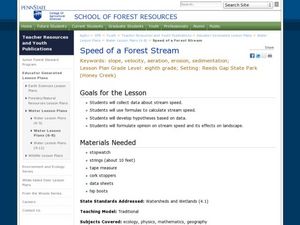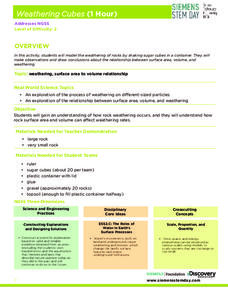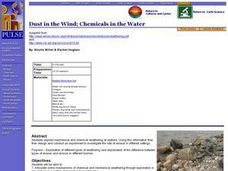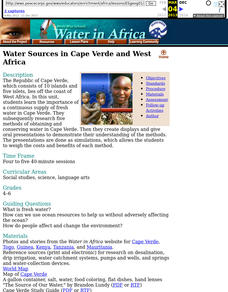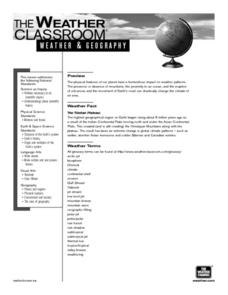Curated OER
Shake, Rattle and Roll
Students compare the weathering of different-sized materials. Comparisons are made and data analyzed to reach conclusions about the process of weathering. Applications can be made for the higher grades.
Curated OER
Soil Formation
In this soil formation worksheet, students will review examples of chemical weathering and biological weathering. Students will also review the different soil layers and how they are created. This worksheet has 6 matching, 5 multiple...
Curated OER
Speed of a Forest Stream
Students study stream speed. In this stream speed lesson students complete an activity and formulate an opinion and study its effects.
Discovery Education
Weathering Cubes
Weathering is not necessarily a result of the weather. Scholars conduct an experiment to explore the effect of surface area and volume on the weathering process. They create their own sugar cube rocks using the same number of cubes—but...
Curated OER
and and Ocean Views of Earth by Remote Sensing
Students explain how satellites help scientists to see more than with the unaided eye and how Landsat technology works. Students identify vegetation and fire sites in the rainforest and detect erosion along rivers. They are able to use...
Curated OER
Desertification
Students investigate the process of desertification in the Sahel region of Africa. They discuss photos from a National Geographic magazine, analyze the physical/political map of the Sahara, identify the causes and effects of...
Curated OER
Class Conservation Corps (CCC)
Students investigate how the loss of soil, a valuable natural resource, affects their lives through loss of productive land to grow food, loss of coastal land mass, and poor water quality from runoff. They design a project to keep soil...
Curated OER
Comparison of Different Methods for Determining Stream Flow at a Stream Site
Students make measurements and calculations to determine the stream flow of an outdoor stream site. In this stream characteristics lesson, students travel to a field site to construct a transect across a stream and measure the...
Curated OER
Weathering Landforms
Fifth graders brainstorm a list of ways the Earth's surface can change. As a class, they are introduced to the concepts of erosion and weathering and discover how wind and water cause changes to the surface of the Earth. To end the...
Curated OER
Looking at Body Language
Learners examine Dorothea Lange's photograph of a migrant mother and consider how artists express emotions, ideas, and physical conditions through gesture, pose, clothing, and expression.
Curated OER
Effects Of Weathering
Third graders simulate weathering and erosion using sand and soil. They define weathering and the ways in which surfaces become weathered. Working as a class, 3rd graders complete various activities that demonstrate physical and...
Curated OER
Rock Cycle SIOP Unit
Students collect rocks, identify them, classify them, investigate their properties, and more. In this rocks lesson plan, students also experiment with soil and erosion and weather.
Curated OER
Failing Ecosystems: Haiti and the Caribbean
Ninth graders study the impact that climate has on the land. They discuss how deforestation leads to erosion and soil damage and how trees and vegetation help to stabilize the land. They draw a large map of the Caribbean and show Haiti...
Curated OER
Shake, Rattle and Roll
Students compare the weathering of materials. in this weathering instructional activity, students experiment with the chemical and physical weathering of different materials. Students use salt and water as an example of how weathering...
Curated OER
Space Science: A Scoop of Moon Dirt
Students discover soil characteristics and how it is formed on Earth and the Moon by examining local samples to a lunar simulant. They replicate the effects of wind erosion by scraping dry bread with sandpaper. Students use rocks and...
Curated OER
Heat Up the Floating Plates
Eighth graders research the connection between the convection currents within the mantle of the earth and the moving of Earth's plates. A connection to lessons at previous grade levels on the rock cycle and important background...
Curated OER
Energy Content Of Foods And Fuels
Students engage in a study of food and how it used as fuel for the human body. They research how biological systems require energy and compare them to the physical science systems like machines. They compare and contrast what they have...
Curated OER
Dust in the Wind; Chemicals in the Water
Students explore mechanical and chemical weathering at stations. They articulate some mechanisms of chemical and mechanical weathering through exploration in a lab. Students stations describe how chemical weathering differs from...
Curated OER
Water Sources in Cape Verde and West Africa
Young explorers study the scarcity and importance of a continuous supply of fresh water in Cape Verde. They research the five main ways that fresh water is obtained in these countries. Each research group prepares a presentation, and...
Curated OER
Ride the Rock Cycle
Students identify the steps in the rock cycle. They complete a K-W-L chart before the activity begins. They answer questions about the stages to complete the activity.
K12 Reader
The Grand Canyon
After reading s short description of the Grand Canyon, readers demonstrate their ability to use context to determine the meaning of words in the passage.
Curated OER
Relative Age Dating
Modeling dough and paper cutouts in science class? Learn about how relative age dating concepts, like the Law of Superposition and cross-cutting relationships, can be used to describe the formation of sedimentary layers.
Curated OER
The Tibetan Plateau
Students discuss the characteristics of the biosphere, with a focus on the Tibetan Plateau. They participate in a question and answer period discussing biomes and climate patterns. They compare and contrast different ecosystems.
Orange County Water Atlas
Location, Location, Location…
Young geographers discover not only how to read and recognize coordinates on a map, but also gain a deeper understanding of latitude and longitude and how climate changes can vary significantly across latitudes.




